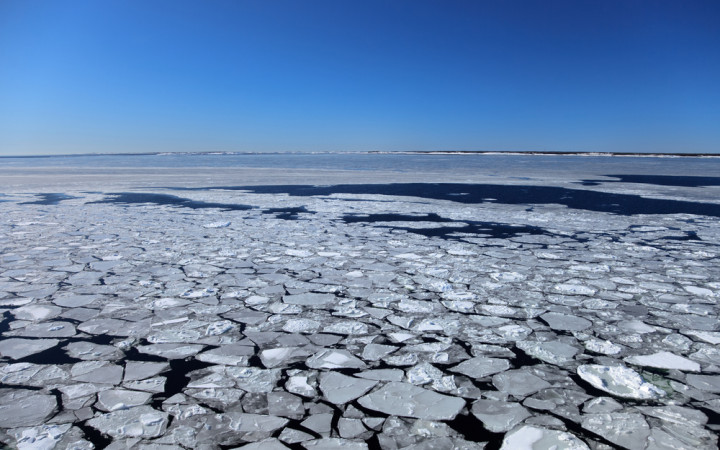Today’s Wonder of the Day was inspired by Drusilla. Drusilla Wonders, “does salt water freeze” Thanks for WONDERing with us, Drusilla!
Isn't ice WONDERful? On a hot day, nothing goes down quite as well as lemonade poured over a glass full of ice cubes. In fact, ice makes so many things better. For example, we love to use ice to make homemade ice cream!
When Old Man Winter comes calling, falling temperatures can turn creeks, lakes, ponds, and even rivers into frozen rinks you can skate on. But what about the ocean? If you've ever been to the ocean in the winter, you've probably noticed that it doesn't freeze like a small pond might.
So does the ocean ever freeze? If you've seen pictures of the North Pole or the South Pole, you know that there are polar ice caps in those places. If the ocean freezes in those areas, why doesn't the rest of the ocean freeze during the winter?
The freezing point of freshwater is 0° Celsius or 32° Fahrenheit. The presence of salt in water, though, reduces the freezing point of water. The more salt in the water, the lower the freezing point will be.
When freshwater freezes, water molecules of hydrogen and oxygen have bonded together into a crystalline structure of ice. The presence of salt makes it harder for water molecules to bond to the ice structure, because ice naturally repels salt molecules. So in a sense, the salt gets in the way of water molecules, blocking them from joining the ice. The salt also bumps into the ice, knocking water molecules off of the structure -- and that's how salt melts ice.
When salt molecules displace water molecules, the freezing rate slows down. This is why salt is often used on icy roads to slow down freezing and make them safer to travel upon.
Although the saltiness of ocean water varies, often ocean water has about 35 grams of salt for every 1,000 units of water. This lowers the freezing point of ocean water to about -1.8° C or 28.8° F. So ocean water will freeze. It just needs to reach a lower temperature.
Another factor that affects the freezing of ocean water is its movement. Unlike ponds, ocean waves move around constantly. This helps ocean water retain heat. As a result, only really cold areas, such as the North Pole or South Pole, usually get cold enough for ocean water to freeze.
When ocean water freezes, though, only the water part freezes. The salt molecules are pushed below the surface of the ice. As a result, polar ice ends up being freshwater ice that can be melted for drinking water!
About 15% of the ocean contains sea ice for at least part of the year. That might not sound like a lot, but that amounts to about 10 million square miles of sea ice!




